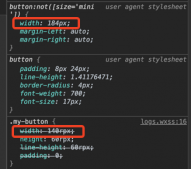微信小程序的登錄界面實(shí)現(xiàn),供大家參考,具體內(nèi)容如下
|
1
2
3
4
5
6
7
8
9
10
11
12
13
14
15
16
17
18
19
20
21
22
23
24
25
26
|
<view class="container"> <view class="wrapper"> <view class="left-top-sign">LOGIN</view> <view class="welcome"> 歡迎回來! </view> <view class="input-content"> <view class="input-item"> <text class="tit">手機(jī)號(hào)碼</text> <input type="text" placeholder="請(qǐng)輸入手機(jī)號(hào)碼" id='phone' data-type='phone' bindinput='handerInput' /> </view> <view class="input-item"> <text class="tit">密碼</text> <input type="password" placeholder="請(qǐng)輸入密碼" id='password' data-type='password' bindinput='handerInput' /> </view> </view> <button class="confirm-btn">登錄</button> <view class="forget-section"> 忘記密碼? </view> </view> <view class="register-section"> 還沒有賬號(hào)? <text>馬上注冊(cè)</text> </view></view> |
最基本的表單提交。
|
1
2
3
4
5
6
7
8
9
10
11
12
13
14
15
16
17
18
19
20
|
data: { phone: '', //手機(jī)號(hào) password: '' //密碼 }, /** * 生命周期函數(shù)--監(jiān)聽頁面加載 */ onLoad: function (options) { }, handerInput(event) { //let type = event.currentTarget.dataset.type; let type = event.currentTarget.id; console.log(event); this.setData({ [type]: event.detail.value }) }, /** |
雙向綁定的實(shí)現(xiàn),利用bindinput 事件,可用id或者dataset 唯一確定數(shù)據(jù)。
id可傳入一個(gè)數(shù)據(jù),dataset可傳入多個(gè)數(shù)據(jù)。
微信小程序的交互:消息顯示框。(官方鏈接)
對(duì)于登錄按鈕綁定一個(gè)點(diǎn)擊回調(diào)函數(shù)。
|
1
2
3
4
5
6
7
8
9
10
11
12
13
14
15
16
17
18
19
20
21
22
23
24
25
26
27
28
29
30
31
32
33
34
35
36
37
38
39
40
41
42
|
//html<button class="confirm-btn" bindtap="login">登錄</button>//jslogin() { let { phone, password } = this.data; console.log(password); /** * 手機(jī)號(hào)驗(yàn)證 * 手機(jī)號(hào)為空 * 手機(jī)號(hào)式錯(cuò)誤 * 手機(jī)號(hào)正確 */ if (!phone) { wx.showToast({ title: '手機(jī)號(hào)不能為空', icon: 'none' }) return; } //定義手機(jī)號(hào)的正則表達(dá)式 let phoneReg = /^1(3|4|5|6|7|8|9)\d{9}$/ if (!phoneReg.test(phone)) { wx.showToast({ title: '手機(jī)號(hào)格式錯(cuò)誤', icon: 'none' }) return; } if (!password) { wx.showToast({ title: '密碼不能為空', icon: 'none' }) return; } wx.showToast({ title: '前端驗(yàn)證通過' }) |
后端驗(yàn)證,調(diào)用接口,通過響應(yīng)的狀態(tài)碼來返回給用戶登錄的信息。
|
1
2
3
4
5
6
7
8
9
10
11
12
13
14
15
16
17
18
19
20
21
22
23
24
25
|
let result = await request('/login/cellphone', { phone, password }); if (result.code === 200) { wx.showToast({ title: '登陸成功', }) } else if (result.code === 400) { wx.showToast({ title: '手機(jī)號(hào)錯(cuò)誤', icon: 'none' }) } else if (result.code === 502) { wx.showToast({ title: '密碼錯(cuò)誤', icon: 'none' }) } else { wx.showToast({ title: '登錄失敗,請(qǐng)重新登錄', icon: 'none' }) }}, |
個(gè)人中心點(diǎn)擊頭像,跳轉(zhuǎn)登錄界面,登錄成功后將用戶個(gè)人信息數(shù)據(jù)緩存(使用setStorageSync,和getStorageSync 方法),然后使用switchTab 跳轉(zhuǎn)到tabbar下的個(gè)人中心頁,然后將獲得的緩存數(shù)據(jù)儲(chǔ)存到j(luò)s的data中,注意json格式的轉(zhuǎn)化,最后在
html里三元運(yùn)算特判一下。
|
1
2
3
4
5
6
7
8
9
|
<view class="user-info-box" bindtap='toLogin'> <view class="portrait-box"> <image class="portrait" src='{{userInfo.avatarUrl?userInfo.avatarUrl:"/static/images/personal/missing-face.png"}}'></image> </view> <view class="info-box"> <text class="username">{{userInfo.nickname?userInfo.nickname: '游客'}}</text> </view></view> |
|
1
2
3
4
5
6
7
8
9
10
11
12
13
14
15
16
17
18
19
20
21
22
23
|
//login.jsif (result.code === 200) { wx.showToast({ title: '登陸成功', }) wx.setStorageSync('userInfo', JSON.stringify(result.profile)); wx.switchTab({ url: '/pages/personal/personal' }) }// personal.jsonLoad: function (options) { let userInfo = wx.getStorageSync('userInfo'); if (userInfo) { this.setData({ userInfo: JSON.parse(userInfo) }) } }, |

以上就是本文的全部?jī)?nèi)容,希望對(duì)大家的學(xué)習(xí)有所幫助,也希望大家多多支持服務(wù)器之家。
原文鏈接:https://blog.csdn.net/weixin_45750972/article/details/115922021


















